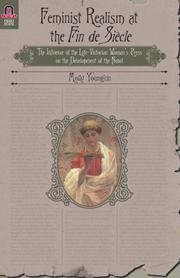| Listing 1 - 8 of 8 |
Sort by
|
Book
ISBN: 1137570768 1349555207 1137566140 Year: 2016 Publisher: New York : Palgrave Macmillan US : Imprint: Palgrave Macmillan,
Abstract | Keywords | Export | Availability | Bookmark
 Loading...
Loading...Choose an application
- Reference Manager
- EndNote
- RefWorks (Direct export to RefWorks)
This book shows how British women writers' encounters with textual and visual representations of ancient Egyptian women such as Hathor, Isis, and Cleopatra influenced how British women represented their own desired emancipation in novels, poetry, drama, romances, and fictional treatises. Molly Youngkin argues that canonical women writers such as Florence Nightingale and George Eliot—and less canonical figures such as Katharine Bradley and Edith Cooper (who wrote under the name 'Michael Field') and Elinor Glyn—incorporated their knowledge of ancient Egyptian women's cultural power in only a limited fashion when presenting their visions for emancipation. Often, they represented ancient Greek women or Italian Renaissance women rather than ancient Egyptian women, since Greek and Italian cultures were more familiar and less threatening to their British audience. This notable distinction opens up discussions about the history of British women, their writing, and the British view on gender in the nineteenth and early twentieth centuries.
English literature --- Women in literature --- Egyptians in literature --- English Literature --- English --- Languages & Literatures --- History and criticism --- Women authors --- Egyptian influences --- Women in literature. --- Egyptians in literature. --- History and criticism. --- Egyptian influences. --- Woman (Christian theology) in literature --- Women in drama --- Women in poetry --- British literature. --- Literature-History and criticism. --- Literature, Modern-19th century. --- Sociology. --- British and Irish Literature. --- Literary History. --- Nineteenth-Century Literature. --- Gender Studies. --- Social theory --- Social sciences --- Literature—History and criticism. --- Literature, Modern—19th century.
Digital
ISBN: 9781137566140 Year: 2016 Publisher: New York Palgrave Macmillan US :Imprint: Palgrave Macmillan
Abstract | Keywords | Export | Availability | Bookmark
 Loading...
Loading...Choose an application
- Reference Manager
- EndNote
- RefWorks (Direct export to RefWorks)
This book shows how British women writers' encounters with textual and visual representations of ancient Egyptian women such as Hathor, Isis, and Cleopatra influenced how British women represented their own desired emancipation in novels, poetry, drama, romances, and fictional treatises. Molly Youngkin argues that canonical women writers such as Florence Nightingale and George Eliot—and less canonical figures such as Katharine Bradley and Edith Cooper (who wrote under the name 'Michael Field') and Elinor Glyn—incorporated their knowledge of ancient Egyptian women's cultural power in only a limited fashion when presenting their visions for emancipation. Often, they represented ancient Greek women or Italian Renaissance women rather than ancient Egyptian women, since Greek and Italian cultures were more familiar and less threatening to their British audience. This notable distinction opens up discussions about the history of British women, their writing, and the British view on gender in the nineteenth and early twentieth centuries.
Science --- wetenschap --- vrouwen --- wetenschappen --- English literature: authors --- Glyn, Elinor --- Cleopatra VII --- Nightingale, Florence --- Eliot, George --- Field, Michael --- Antiquity --- anno 1800-1899 --- anno 1900-1909 --- anno 1910-1919 --- Egypt
Book
Year: 2007 Publisher: Columbus : Ohio State University Press,
Abstract | Keywords | Export | Availability | Bookmark
 Loading...
Loading...Choose an application
- Reference Manager
- EndNote
- RefWorks (Direct export to RefWorks)
Modernism (Literature) --- Realism in literature. --- Women in literature. --- Feminism in literature. --- Women and literature --- Journalism and literature --- Feminist fiction, English --- English fiction --- Feminism and literature --- History --- History and criticism.
Book
Year: 2007 Publisher: Columbus : Ohio State University Press,
Abstract | Keywords | Export | Availability | Bookmark
 Loading...
Loading...Choose an application
- Reference Manager
- EndNote
- RefWorks (Direct export to RefWorks)
Modernism (Literature) --- Realism in literature. --- Women in literature. --- Feminism in literature. --- Women and literature --- Journalism and literature --- Feminist fiction, English --- English fiction --- Feminism and literature --- History --- History and criticism.
Book
ISBN: 9781934555606 1934555606 Year: 2008 Publisher: Kansas City, Mo. Valancourt Books
Abstract | Keywords | Export | Availability | Bookmark
 Loading...
Loading...Choose an application
- Reference Manager
- EndNote
- RefWorks (Direct export to RefWorks)

ISBN: 9780814210482 Year: 2007 Publisher: Columbus Ohio State University Press
Abstract | Keywords | Export | Availability | Bookmark
 Loading...
Loading...Choose an application
- Reference Manager
- EndNote
- RefWorks (Direct export to RefWorks)
English fiction --- Feminism and literature --- Feminism in literature --- Feminist fiction, English --- Journalism and literature --- Modernism (Literature) --- Realism in literature --- Women and literature --- Women in literature --- Woman (Christian theology) in literature --- Women in drama --- Women in poetry --- Neorealism (Literature) --- Magic realism (Literature) --- Mimesis in literature --- Literature and journalism --- Literature --- Feminist theory in literature --- History and criticism --- History
Digital

ISBN: 9781442665699 9781442646445 Year: 2017 Publisher: Toronto, Ont. University of Toronto Press
Abstract | Keywords | Export | Availability | Bookmark
 Loading...
Loading...Choose an application
- Reference Manager
- EndNote
- RefWorks (Direct export to RefWorks)
Digital

ISBN: 9781474433921 Year: 2022 Publisher: Edinburgh Edinburgh University Press
Abstract | Keywords | Export | Availability | Bookmark
 Loading...
Loading...Choose an application
- Reference Manager
- EndNote
- RefWorks (Direct export to RefWorks)
| Listing 1 - 8 of 8 |
Sort by
|

 Search
Search Feedback
Feedback About UniCat
About UniCat  Help
Help News
News